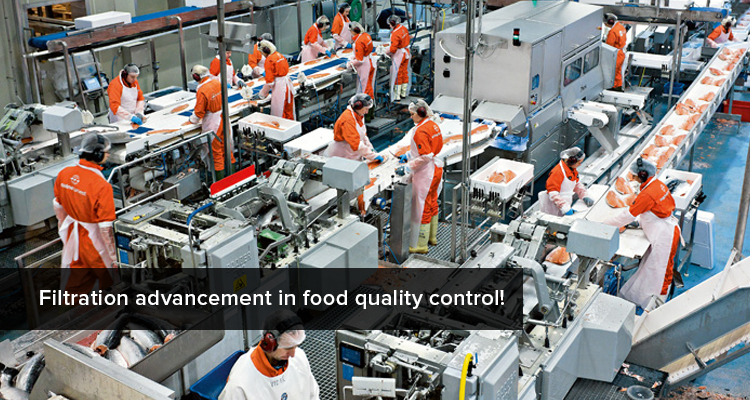Food quality control requires a significant amount of focus, with an increased level of contamination the crucial need to make available clean and safe food to people is a matter of great significance. Food quality control requires membrane filtration with technological advancements to provide with greater results. The dire need of filtration techniques which works efficiently for to provide end results of quality which are safe from contamination not only by outside dirt but also to see to it that the filtration elements doesn’t affect the quality of the food. The list for food and beverage industry with dire needs of filtration includes beer, fruit juices, and dairy products, the liquid state of these products makes the systems of membrane filtration effective and efficient into providing clean and safe end results and ready to market off products. The famous membrane filtration is widely used in the food industry, with its efficient technique that uses a physical barrier, the filter to separate particles in a fluid, particles are separated on the basis of size and shape, the use of pressure and specially designed membranes with different pore sizes help barricade the particles(dirt) away from other elements.
Types of membrane filtration techniques
Membrane filtration is a designed form of technique to filter liquids efficiently to provide with clean and safe end-products for consumption. There are different designs of techniques and methods of membrane filtration available in the market, namely being reverse osmosis, nanofiltration, ultrafiltration, and microfiltration. Reverse osmosis, as the same suggests, uses pressure to reverse the natural flow of pure solvent, and remove unwanted particles from drinking water or any other liquid with utilizing partially permeable membrane. Nanofiltration is a recently surfaced filtration process used for low total dissolved solids liquids such as surface water or fresh groundwater, it softens and removes disinfection by-product precursors such as natural organic matter and synthetic organic matter. Nanofiltration is widely used in beverages industries such as dairy for both concentration and partial demineralization. Ultrafiltration is yet another form of membrane filtration which uses a pressure-driven barrier to suspended solids, bacteria, viruses, and endotoxins to produce with very high purity and low silt density. It is known to use hydrostatic pressure which forces a liquid against a semi-permeable membrane. Microfiltration is the type of membrane filtration system with physical filtration process where a contaminated fluid is passed through a special pore-sized membrane to separate microorganisms and suspended particles from process liquid.
Food industries using membrane filtration techniques
Membrane filtration is utilized in a number of food factories of varied types, with dairy products and fruit and vegetable juices being the top enlisted products utilizing this technique. The food and beverages industries use membrane filtration for clarification, concentration, fractionation, desalting, and purification, also used for improving and ensuring of food safety of products cutting out the heat treatment. Cheese and microfiltered milk are the two of the top enlisted food products using this efficient technique of filtration to improve and ensure food qualities. The techniques of ultrafiltration and microfiltration respectively are used to improve and filtrate cheese and microfiltered milk. The ultrafiltration techniques provide with opportunities to ensure and regain the by-products lost in processing making cheese not only clean and safe but also healthier with higher nutritional value-added, while ultrafiltration works on the regaining of the loss of efficient by-products of the cheese, the system of microfiltration helps purify the cheese for processing when is worked directly from cow milk, removing the undesirable microorganisms form the milk. Whereas microfiltered milk utilizes microfiltration system of membrane filtration as suggests the name, the good old heat treatments to purify milk at the end starts affecting the taste of the product hence loss of taste of the products leads to loss of products handling in the market, with microfiltration the not only the food quality improves also the taste is retained hence providing with a better alternative to filtrate milk products.
Advantages of membrane filtration
- Membrane filtration is known to be one of the most flexible of techniques in terms with its usage, it could be utilized for separation, concentration, and purification of huge variety of materials for a wide range of industries.
- Microfiltration and ultrafiltration processes are known to be highly efficient screens capable of fractioning particles according to size.
- No phase change is involved with the products involved, the state of both feed and products remain the same liquid form.
- Membrane filtration processes can function effectively and efficiently at low levels of temperatures too.
- Energy requirements for the operation of membrane filtration are low.
- The membrane filtration processes are relatively simple to scale up.
- Membranes can be manufactured in a consistent and highly accurate manner.
Disadvantages of membrane filtration
- The membrane filtration processes are prone to membrane fouling effects which could lead to a decrease in permeate flux, which involves expensive cleaning and regeneration schemes.
- The high flow rates used in cross-flow feed can damage the sensitive materials of the products.
- The equipment used in membrane filtration involves a high cost.
- High amount of focus is required, if not precisely controlled membranes with wide pore size distribution may result, giving poor separation performance.
Author Bio: Gaurav Patel, the contributor of this piece, is Marketing Head for Filter Concept Pvt. Ltd. We providing filtration solution by manufacturing Filter and Cartridges for different industries. If you have views to share to add value, feel free to drop an email at, info@filter-concept.com

